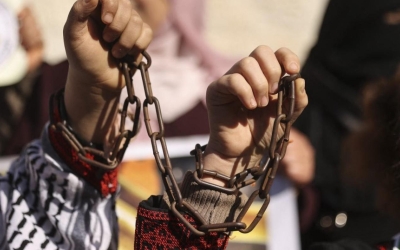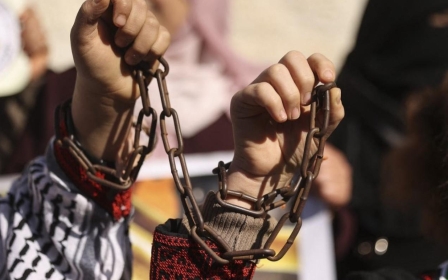Israel's non-democratic laws will have a devastating impact on the Palestinians

Since taking office last December, the far-right Israeli government led by Prime Minister Benjamin Netanyahu - along with Minister of National Security Itamar Ben-Gvir, Minister of Finance Bazalel Smotrich, and others - has imposed profound changes to Israeli law.
For months, Jewish Israelis have taken to the streets to protest against these judicial reforms, which would severely undermine the Supreme Court's powers and oversight of the legislative and executive branches.
The 37th Israeli government has focused its policy guidelines on the following three areas, which overlap and cannot be separated from each other: sovereignty, national security, and settlement expansion.
New MEE newsletter: Jerusalem Dispatch
Sign up to get the latest insights and analysis on Israel-Palestine, alongside Turkey Unpacked and other MEE newsletters
These guidelines reveal the objective of the new government: to further entrench Israel as a non-democratic Jewish supremacy inclined towards settler-racist fascism that does not recognise the Palestinian people or their rights.
Authoritarian measures
According to government officials, the new guidelines established by Israel's coalition leaders seek to restore a balance between the legislative, executive, and judicial branches. Israeli Justice Minister Yariv Levin announced in January the judicial reforms and a comprehensive plan to implement them in stages.
These changes can be divided into four categories: 1) A series of laws that remove the judiciary's oversight authority; 2) an amendment to Israeli Basic Law that specifies conditions to invalidate laws and transfers authority to the Israeli parliament (Knesset); 3) the tightening of government control over the selection of judges; 4) an amendment to how the Attorney General, ministers, and other government officials are appointed.
One of the proposed reforms is to limit the authority of the Supreme Court in order to prevent it from annulling laws passed by the Knesset deemed unconstitutional and in violation of Israel's Basic Laws.
The change would allow parliament members to circumvent the high court's decisions and reinstate laws that were previously overturned. Although this is a very extreme step, the ruling coalition is working to pass this proposed law with a simple majority of 61 Knesset members.
If passed, the proposed law would allow Israeli parliament members to add an "override clause" to each future bill, shielding it from any subsequent judicial oversight or criticism.
This would last throughout the Knesset term and for a period of no less than two years from the day the law was passed. And, if the future Knesset wants to extend the validity of the overriding law, it can do so once again based on a majority vote.
Another proposed amendment states that no decision can be made to change, repeal, or limit the validity of any law passed through the parliament's override clause.
Solidifying its control
Israel's Basic Law stipulates that the decision to change or repeal a law must be made unanimously by a judicial body of all the Supreme Court justices.
In turn, the Israeli government is working to change the composition of the judge selection committee and the judges' composition in a way that guarantees its control and that of the ruling coalition - thus politicising the committee.
Another strategy is to revoke the standard of the "reasonableness" of a law. This test enables the Supreme Court to quash an administrative order issued by the government due to its "unreasonableness" and ensures that the ruling party does not promote inequality or harbour "illogical motives", conflicts of interests, or "alien" goals.
So far, the high court has used this standard to overturn "unreasonable" decisions and render them illegal. Israeli Attorney General Gali Baharav-Miara relied on this measure to oppose the decision to appoint the head of the Shas party, Aryeh Deri, as a minister in the 37th Israeli government based on his criminal conviction on corruption charges.
Baharav-Miara recently stopped Ben-Gvir's decision to dismiss the Tel Aviv police chief and transfer him to another job, pending a valid judicial procedure. And the attorney general indicated that her initial investigation raised serious concerns about the legality of the decision.
In response, Ben-Gvir asked coalition leaders to fire her from her job without concern for the legality of his demands.
In practice, revoking the reasonableness test significantly undermines the Supreme Court's ability to intervene in government decisions, and will free the government to do whatever it wishes without any legal oversight.
According to the law proposed by MK Simcha Rotman of the Religious Zionist party, the provision of the "reasonableness" of a law does not apply to "representatives of the public", such as the prime minister, government ministers, council heads, and other elected officials.
The proposed law states: "Despite what was stated in this Basic Law, whoever has the authority to litigate according to the law, including the Supreme Court, is not entitled to discuss or give an order against the government, the prime minister, a minister among its ministers, or another representative of the public concerning the reasonableness of their decisions" (Articles 15 and 15a, the Law of Judiciary).
Proposed governance law
To preempt the disqualification of an appointed minister, a new proposed law would stipulate that: "There is no possibility for legal oversight by any judicial body with regard to the eligibility to appoint or transfer a minister from office, except for specific cases."
The proposed amendment would inform the Supreme Court that it is incompetent and does not have the authority to apply its legal oversight for any reason whatsoever
This change would place all authority in the hands of the prime minister who is then free to appoint cabinet members with the approval of the parliament and without judicial oversight.
Previously, the conditions for eligibility were set by the Knesset but were subject to judicial rulings and standards.
The proposed amendment would therefore inform the judiciary, including the Supreme Court, that it is incompetent and does not have the authority to apply its legal oversight for any reason whatsoever, except for the conditions of capacity "established by law" - meaning physical or mental matters and only two clauses (Section 16.1 (b1)(5)).
This proposed change came in response to the Supreme Court’s intervention in revoking the appointment of minister Aryeh Deri, who had pledged before the court in his previous file that he would not run again for a political position and would stay away from political life - which he violated when he ran again - and was even appointed by Netanyahu as a minister in the current government.
Another amendment states that: "The declaration of the Prime Minister's incapacity shall be made by informing the Knesset of that by himself or by the government, through a decision by three out of four of its members, and only both of them [the Prime Minister and his government] are authorised to do so" (Article 16.1 (b1)(1)).
It adds: "Courts, including the Supreme Court, are not authorized to discuss or approve a request to disqualify or endorse, and any such decision or order issued by the court is null and void." (Section 16.1 (b1)(4))
This amendment aims to prevent the possibility of dismissing a prime minister in cases of suspected criminal offences, as happens to be the case with Netanyahu, who is being tried on charges of corruption and breach of trust.
No authority
The current law affirms that the power to repeal a law, question its validity, or postpone it for a temporary period rests with the Supreme Court, provided that the following conditions are met: the court convenes with the full composition of its judges and a decision is made by a majority of four out of five of the judges.
The proposed change states that even if all the conditions that allow for judicial oversight are met, the Supreme Court would not have the authority to decide on the validity of a law if the Knesset clearly decided that it is valid, despite what was stated in the Basic Law.
This law restricts the Supreme Court and effectively eliminates its authority to abolish any law, no matter how racist, dictatorial, or unreasonable it is.
Another amendment involves the appointment of judges.
According to the new proposal, the number of the Judicial Selection Committee members would be increased from nine to 11 and divided into two committees: one for the selection of Supreme Court justices and the other for selecting judges in the other courts.
The committee for the selection of Supreme Court justices would consist of three ministers, three Knesset members from the ruling coalition, two Knesset members from the opposition, and three Supreme Court justices, including the chief justice. That translates to a majority of 6 members of the ruling coalition.
In addition, the government's plan calls for abolishing the rule of appointing the most senior Supreme Court justice as chief of the court, so that the chief justice is to be appointed by an ordinary majority in the committee whose majority members are from the ruling coalition. This means complete government control over the Supreme Court.
The rules involving the appointment of the Attorney General and judicial counsels to the Knesset and various ministries will also change if these reforms are passed.
Ultimately, the amendment seeks to politicise the Attorney General's position and the Justice Ministry, while simultaneously weakening the status of legal counsels in government ministries so that their professional opinions become nonbinding recommendations as they are appointed politically by the minister directly.
Legalised fascism
These legal reforms, which aim to undermine the Israeli judiciary, have greatly concerned many ordinary Israelis. Israeli President Isaac Herzog presented a new settlement proposal regarding the judicial crisis. However, his offer was rejected by the ruling coalition.
The ruling coalition has a majority that will enable all of these non-democratic laws to pass
Prime Minister Benjamin Netanyahu stated that the main provisions contained in Herzog's plan would maintain the status quo and would not achieve the needed "balance" between the three government branches. The heads of the ruling coalition issued a unified position stating that this plan is biased in favour of reform opponents.
A reading of these laws, proposals, and amendments, which have been presented since the beginning of this government's rule, shows that the outcome is a fascist dictatorial regime in which there is no separation of powers as the government and the Knesset work without oversight or accountability.
The ruling coalition has a majority that will enable all of these non-democratic laws to pass. These changes will not only affect Israelis but will also, of course, have a devastating impact on occupied Palestine and those living as second-class citizens in Israel.
The army, police - including oversight of the police - and the courts are all in the hands of the right-wing government. In just a few months since taking office, Smotrich has called for "wiping out" the Palestinian town, Huwwara, from existence and declared that there is no such thing as a Palestinian people.
Ben-Gvir has expanded his own powers and pushed through amendments to the police decree demanding that Mahash, Israel's police investigation unit (for violations and criminal offences), be transferred to his authority and no longer under the Public Prosecution in the Justice Department.
The judicial reforms are just one step in implementing the dangerous ideology of the current far-right government which aims to eliminate the Palestinians.
The views expressed in this article belong to the author and do not necessarily reflect the editorial policy of Middle East Eye.
Middle East Eye delivers independent and unrivalled coverage and analysis of the Middle East, North Africa and beyond. To learn more about republishing this content and the associated fees, please fill out this form. More about MEE can be found here.






